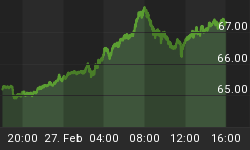Layoffs surge to 17-month high
Speaking of job cuts
Ford and Chrysler join the profit-killing club
Higher shipping costs hurt Invacare
The bulls tried their best to mount another rally this morning after getting a better-than-expect non-manufacturing ISM report, but the painful consequences of $60 oil was just too obvious to ignore.
Oil hit an all-time high today after rising by $1.69 to $61.28 a barrel.
Oil prices have rose by 74% in the last 12 months and 43% more than they were at the beginning of the year.
The Wall Street crowd is attempting to explain away today's jump in oil to two tropical storms in the Gulf of Mexico. The fear is that these storms in the Gulf of Mexico will disrupt supplies and cut refinery output.
Those storms may affect supplies since the Gulf of Mexico accounts for roughly 25% of our domestic oil production and 38% of our refining capacity.
Make no mistake about it. Oil prices are where they are because of rising demand and the scarcity of refining capacity. Not because of tropical storms.
No matter how hard Wall Street tries to spin that news, sky-high oil prices will have a significant impact on our economy.
Heck, I almost passed out at the cost of filling up the gas tank of my wife's Chevy Suburban. It may not be long before the price of a fill-up exceeds $100 for my family.
Frankly, I am surprised that the stock market didn't fall even more today's after the surge in oil. The bulls want you to believe that the market's ability to largely shrug off these higher oil prices is proof positive that stock market is stronger than an ox. There's another -- and more intelligent -- way to look it. What I see is a total disconnect between reality and dreams, which means that the stock market is overdue for a big, big fall.
If you're portfolio doesn't include a significant amount of defense built into it, I'd urge you to do so...especially the recommendations in Martin's Safe Money Report.
Layoffs surge to 17-month high. According to a Challenger, Gray & Christmas survey released today, the job situation is America is getting worse...not better.
Corporate America is cranking up the pace of layoffs. In the month of June, U.S. employers announced 110,996 jobs cuts -- the highest amount in 17 months. For all of 2005, the pace of job cuts has jumped by 538,274 jobs -- a 14% increase of the same period in 2004.
That is a 35% increase from May, 92% more than the month of April, and 73% more than June of 2004.
Those are big numbers, but you need to give them into the proper perspective.
==> Historically, the summer months are among the slowest for layoff announcements. This surge in June tells me that there is a structural change for the worse that has yet to be reflected in the overall unemployment numbers.
==> Roughly two-thirds of the layoffs cuts were in two industries: automobile (45,378) and retail (24,065). Whether it is because of sluggish wage growth, too much debt, rising interest rates, or a combination of all three -- the consumer isn't spending money like a drunken sailor anymore. That is bad news for our consumer-driven economy.
As these layoff numbers show, Greenspan's "soft patch" story is way off base. The second half of the year is going to be full of surprises...bad surprises.
Speaking of job cuts. Sanyo makes a variety of consumer electronic devices such as cell phones, digital cameras, refrigerators, DVD players, television, computers, batteries, microwave ovens, and air conditioners.
Even though Sanyo is a Japanese company, it is worth your attention because it can help determine how its American counterparts are faring.
According to Sanyo, the consumer electronic business isn't so good. Sanyo announced today that it would eliminate 14,000 jobs and close 20% of its factories.
What's the problem? Falling prices for digital cameras and cellular phones.
If you're a Nokia, Motorola, Texas Instruments, or Ericsson investor, you should ask yourself how this Sanyo news will affect you.
In case you're not sure, the answer is: NOT GOOD.
Ford and Chrysler join the profit-killing club. General Motors has sold a bunch of cars with its employee discount promotion. They aren't making little -- if any -- profit on those discounted cars...but they are selling lots of them.
Yesterday, Ford joined the fight with its Ford Family Plan discounts and today, Chrysler announced that it too is willing to sacrifice profits to keep market share.
Chrysler is offering even bigger discounts than both GM and Ford.
"Today, we top that by offering employee prices plus cash back."
Yup, Chrysler is offering both the employee discount price in addition to cash rebates.
What I see is a combination of (a) profitless prosperity for GM, Ford, and Chrysler and (b) an even higher mountain of debt for Americans that are too willing to go into debt to buy cars they can't afford.
Higher shipping costs hurt Invacare. I guess I'm not the only person complaining about higher fuel costs.
Wheelchair-maker Invacare warned today that its Q2 and 2005 earnings would be below expectations.
For the year, Invacare now expects to make $2.20 to $2.40 of profits on $1.6 billion to $1.61 billion of sales. That's below the $2.60 to $2.80 on $1.64 to $1.66 billion of sales Invacare forecasted back in April.
The problem?
"Lower-than-expected sales and a rise in freight costs."
I thought it was extremely interesting that Invacare could quantify precisely how much higher fuel costs have hurt it.
"Freight costs also negatively impacted prior guidance by approximately $0.06 per share largely due to fuel surcharges driven by the high price of oil."
The next time you hear a Wall Street idiot pooh-pooh the effects of $60 oil, remember that Invacare statement. And don't forget to put that hear-no-evil expert into your do-not-listen-to list.















